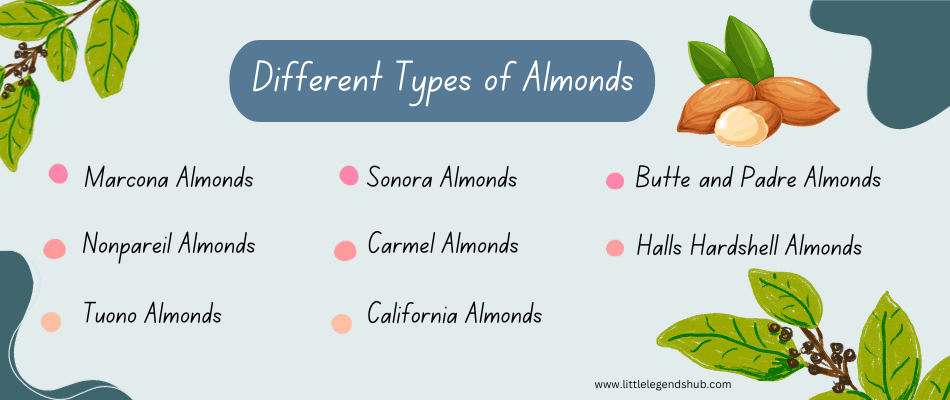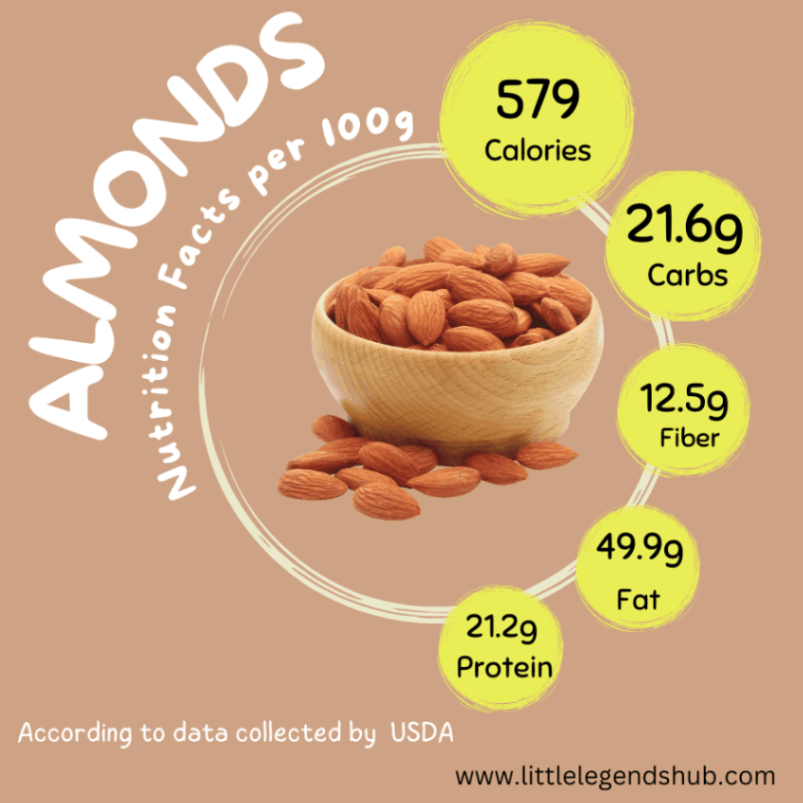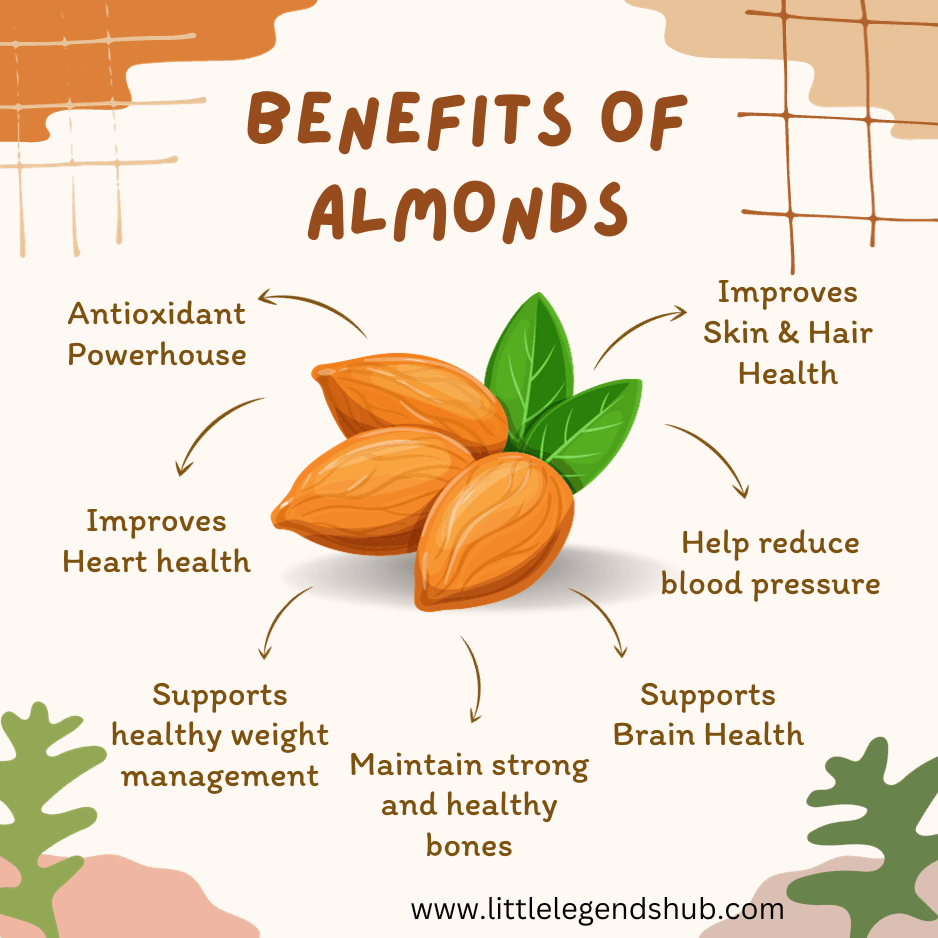Are almonds a superfood? Let’s find out! In this blog post, we’ll explore the incredible benefits that make these tiny nuts a nutritional powerhouse. Get ready to discover why almonds are hailed as a superfood and how they can contribute to your overall health in simple and effective ways.”
When it comes to wholesome snacks and versatile ingredients, almonds often top the list. These small, but mighty nuts have a rich history, impressive nutritional profile, and a wide array of health benefits that make them a favorite among nutrition enthusiasts.
Are Almonds a Superfood ?
Almonds, scientifically known as Prunus dulcis, are beloved for their versatility, crunchy texture, and countless health benefits.In this article, we will look into the fascinating world of almonds, from their historical origins to their remarkable nutritional value and the numerous ways they contribute to a healthy lifestyle.And yes, almonds are indeed a superfood, packing a powerful punch of nutrition!
The History of Almonds

Almonds have been cultivated for thousands of years, with their origins dating back to the Mediterranean and Middle East. Notably,the exact origin of almonds can be traced to regions around Iran, where they were first domesticated.
They were also highly prized by ancient civilizations such as the Egyptians, Romans, and Greeks. In fact, almonds were a symbol of fertility and longevity and were even found in the tomb of King Tutankhamun. It’s a testament to the enduring popularity of almonds throughout history.
A Peek into Different Types of Almonds
Now, let’s dive into the fascinating world of different types of almonds. These variations showcase the versatility and nutritional richness of these superfood nuts :
Sweet Almonds: These are the most common almonds you find in the store. They have a mild, slightly sweet taste and are great for snacking or cooking.
Bitter Almonds: Bitter almonds taste, well, bitter. They have a natural toxin and aren’t eaten as snacks. Instead they are mainly used to produce almond extracts and oils.
- Marcona Almonds: These almonds, originating from Spain, are round and soft. With their sweet, delicate flavor, they are commonly used in fancy dishes.

- Nonpareil Almonds: Known for their smooth shell and fantastic taste, these almonds are often considered top-notch for snacking.
- California Almonds: These are the most common almonds, characterized by a slightly sweet, nutty taste. They’re frequently used for almond products such as almond butter and almond milk.
- Carmel Almonds: These almonds have a rich, nutty flavor and are often used for snacking and in recipes.
- Sonora Almonds: They’re large and have a sweet taste. They’re used in almond products and as snacks.
- Butte and Padre Almonds: These almonds have a nice balance of size and flavor and can be used in many dishes.
- Tuono Almonds: Tuono almonds have thick shells and are resistant to pests. They are grown in Italy and used in sweet and savory dishes.
- Halls Hardshell Almonds: These almonds have tough shells for better protection and are known for their consistent quality and flavor.
Each type of almond has a unique taste and use, so you can pick the one that’s best for your snacking or cooking needs.
Nutritional Value of Almonds
Almonds are packed with essential nutrients, making them a valuable addition to any diet.
Vitamins and Minerals

Almonds are a rich source of vitamins such as vitamin E and several B vitamins, along with important minerals like magnesium, phosphorus, and calcium.
Vitamin E is a standout nutrient in almonds; a 100-gram serving provides a remarkable 131% of the recommended daily intake. This potent antioxidant also plays a crucial role in protecting your cells from damage and may contribute to various aspects of your health, ranging from skin health to immunity.
Protein Packed
Almonds are an excellent source of plant-based protein, making them an ideal choice for vegetarians and vegans. They also contain monounsaturated fats, which promote heart health.
Almonds are not only a source of plant-based protein but also provide all nine essential amino acids, making them a valuable addition to vegetarian and vegan
Healthy Fats
Almonds are a great source of monounsaturated fats, the heart-healthy fats that can help lower the risk of heart disease.
Fiber-Rich
High in dietary fiber, almonds aid digestion, promote a feeling of fullness, and help maintain healthy blood sugar levels.
Health Benefits of Almonds: The Superfood for Your Well-Being
Almonds are often referred to as a superfood because of the numerous ways they promote good health.They offer a multitude of health benefits, making them an essential addition to your diet:
Heart Health

Research shows that consuming almonds may help reduce the risk of heart disease. Furthermore, the monounsaturated fats and antioxidants in almonds can actively contribute to lowering bad cholesterol levels and protecting the heart.
Weight Management
Despite their calorie density, research shows that incorporating almonds into your diet can help with weight management, likely due to their high protein and fiber content. Almonds are a satisfying snack, thanks to their high protein and fiber content. They can aid in controlling appetite and weight management.
Blood Sugar Control
Almonds have a low glycemic index, making them an excellent choice for individuals with diabetes as they can help regulate blood sugar levels.
Bone Health
Almonds are an excellent source of calcium and phosphorus, vital for maintaining strong and healthy bones.
Antioxidant Powerhouse
Loaded with vitamin E, almonds can also help combat oxidative stress and protect cells from damage.
Brain Health
The healthy fats and antioxidants in almonds are believed to support brain health and may help reduce the risk of age-related cognitive decline.
Skin and Hair Health
The vitamins and antioxidants in almonds contribute to healthier skin and hair. Almond oil is often used in beauty products for its moisturizing properties.
Almond Allergies and Precautions
Although almonds are nutritious, some people are allergic to them. Allergic reactions can range from mild to severe. Moreover, if you have almond allergies, it’s crucial to read labels carefully and be aware of potential cross-contamination risks for optimal safety.
Almonds are undoubtedly one of the healthiest nuts to consume. By incorporating them into your daily diet, you’re not only savoring a delightful taste but also giving your body a boost of nutrients and wellness. Whether you enjoy them as a snack, in a meal, or as part of your skincare routine, almonds offer a wide range of benefits for your health and well-being.
Almonds are considered a superfood because they are packed with goodness. They are loaded with healthy fats that are good for your heart, and they have lots of protein and fiber that help you feel full. Plus, they’re rich in vitamins and minerals like vitamin E and magnesium, which are great for your health. So, when you eat almonds, you’re giving your body a big boost of nutrients, and that’s why they’re called a superfood.
So, go ahead, grab a handful of almonds, and let their history and health benefits amaze you!We’ll share some delicious recipes and ideas.
Frequently Asked Questions (FAQs)
Are almonds good for weight loss?
Almonds can support weight loss when consumed in moderation due to their high protein and fiber content.
Can almond milk be a suitable dairy milk replacement for everyone?
Almond milk is a dairy-free option suitable for most people, but individuals with nut allergies should avoid it.
How can I incorporate almonds into a vegetarian diet?
Almonds can be used in various ways, such as almond butter, almond flour in baking, and as a topping for salads.
What are the potential side effects of almond consumption?
In rare cases, almonds can cause allergic reactions, which may range from mild itching to severe anaphylaxis.
What is the daily recommended almond intake for optimal health benefits?
Consuming a small handful (about 1 ounce) of almonds daily is a good guideline for reaping their health benefits.
